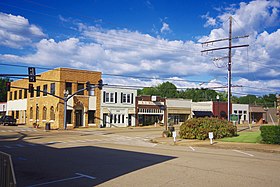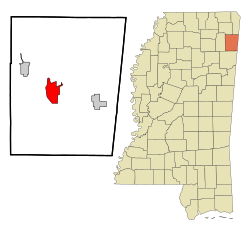Fulton is a city in and the county seat of Itawamba County, Mississippi, United States.[3] The population was 4,542 at the 2020 census.[4]
Fulton, Mississippi | |
|---|---|
| City of Fulton | |
 Downtown Fulton | |
 Location in Itawamba county and Mississippi | |
Location in the United States | |
| Coordinates: 34°15′40″N 88°24′05″W / 34.26111°N 88.40139°W | |
| Country | |
| State | |
| County | Itawamba |
| Districts | 1, 4, 5 |
| Founded | July 26, 1837 |
| Incorporated | May 11, 1837 |
| Named for | Robert Fulton |
| Government | |
| • Type | Mayor–Council |
| • Council | Board of Aldermen |
| Area | |
• Total | 8.71 sq mi (22.55 km2) |
| • Land | 8.49 sq mi (21.99 km2) |
| • Water | 0.21 sq mi (0.55 km2) |
| Elevation | 308 ft (94 m) |
| Population (2020) | |
• Total | 4,542 |
| • Density | 534.92/sq mi (206.52/km2) |
| Time zone | UTC-6 (Central (CST)) |
| • Summer (DST) | UTC-5 (CDT) |
| ZIP code | 38843 |
| Area code | 662 |
| FIPS code | 28-26300 |
| GNIS feature ID | 2403670[2] |
| Website | fulton |
The city is part of the Tupelo Micropolitan Statistical Area.
History
editFulton is named for Robert Fulton, inventor of the steamboat.[5] The city was incorporated on May 11, 1837.[6] The U.S. post office was established on July 26, 1837, marking the official launch of the service in Fulton.[7]
Geography
editFulton is located west of the center of Itawamba County and is bordered to the west by the Tennessee–Tombigbee Waterway.
Interstate 22/U.S. Route 78 passes through the southern part of the city, with access from Exit 104 (S. Adams Street). I-22 leads west 19 miles (31 km) to Tupelo and east 25 miles (40 km) to Hamilton, Alabama. Mississippi Highway 25 passes through the southeastern part of Fulton, leading south 14 miles (23 km) to Smithville and north 26 miles (42 km) to Belmont.
According to the United States Census Bureau, Fulton has a total area of 8.7 square miles (22.6 km2), of which 8.5 square miles (22.0 km2) are land and 0.23 square miles (0.6 km2), or 2.46%, are water.[4]
Demographics
edit| Census | Pop. | Note | %± |
|---|---|---|---|
| 1850 | 275 | — | |
| 1870 | 132 | — | |
| 1880 | 249 | 88.6% | |
| 1890 | 172 | −30.9% | |
| 1900 | 171 | −0.6% | |
| 1910 | 194 | 13.5% | |
| 1920 | 227 | 17.0% | |
| 1930 | 927 | 308.4% | |
| 1940 | 1,154 | 24.5% | |
| 1950 | 1,343 | 16.4% | |
| 1960 | 1,706 | 27.0% | |
| 1970 | 2,899 | 69.9% | |
| 1980 | 3,238 | 11.7% | |
| 1990 | 3,387 | 4.6% | |
| 2000 | 3,882 | 14.6% | |
| 2010 | 3,961 | 2.0% | |
| 2020 | 4,542 | 14.7% | |
| U.S. Decennial Census[8] | |||
2020 census
edit| Race | Num. | Perc. |
|---|---|---|
| White (non-Hispanic) | 3,439 | 75.72% |
| Black or African American (non-Hispanic) | 795 | 17.5% |
| Native American | 7 | 0.15% |
| Asian | 15 | 0.33% |
| Other/Mixed | 156 | 3.43% |
| Hispanic or Latino | 130 | 2.86% |
As of the 2020 United States census, there were 4,542 people, 1,255 households, and 797 families residing in the city.
2000 census
editAs of the census[10] of 2000, there were 3,882 people, 1,357 households, and 891 families residing in the city. The population density was 450.3 inhabitants per square mile (173.9/km2). There were 1,508 housing units at an average density of 174.9 per square mile (67.5/km2). The racial makeup of the city was 83.69% White, 14.61% African American, 0.23% Native American, 0.52% Asian, 0.28% from other races, and 0.67% from two or more races. Hispanic or Latino of any race were 1.26% of the population.
There were 1,357 households, out of which 26.5% had children under the age of 18 living with them, 48.3% were married couples living together, 13.9% had a female householder with no husband present, and 34.3% were non-families. 31.8% of all households were made up of individuals, and 16.5% had someone living alone who was 65 years of age or older. The average household size was 2.29 and the average family size was 2.88.
In the city, the population was spread out, with 18.7% under the age of 18, 21.3% from 18 to 24, 20.9% from 25 to 44, 19.3% from 45 to 64, and 19.8% who were 65 years of age or older. The median age was 35 years. For every 100 females, there were 83.5 males. For every 100 females aged 18 and over, there were 82.8 males.
The median income for a household in the city was $29,449, and the median income for a family was $42,287. Males had a median income of $33,490 versus $23,278 for females. The per capita income for the city was $15,540. About 9.7% of families and 16.9% of the population were below the poverty line, including 21.4% of those under age 18 and 17.2% of those age 65 or over.
Education
editFulton is served by the Itawamba County School District.
Media
edit- W39CA-D Channel 39 TV is a Unity Broadcasting Network station.
Infrastructure
editThe Mississippian Railway provides rail service to local companies. The Tennessee–Tombigbee Waterway provides water transportation for industries in Fulton.
Notable people
edit- Donnie Bell, member of the Mississippi House of Representatives[11]
- Brian Dozier, Major League Baseball infielder
- Ally Ewing (nee McDonald), professional golfer on LPGA Tour[12]
- Roy Gregory, former head football coach for Austin Peay State University[13]
- Jimmie Lunceford, jazz alto saxophonist and bandleader in the swing era
- Maikhail Miller, former American football quarterback[14]
- Vernon Presley, father of Elvis Presley
- Chad Ramey, professional golfer who plays on the PGA Tour
- Lyonel Thomas Senter Jr., U.S. federal judge
- Samuel M. Taylor, congressman from Arkansas
- Peggy Welch, member of the Indiana House of Representatives
References
edit- ^ "2020 U.S. Gazetteer Files". United States Census Bureau. Retrieved July 24, 2022.
- ^ a b U.S. Geological Survey Geographic Names Information System: Fulton, Mississippi
- ^ "Find a County". National Association of Counties. Archived from the original on May 31, 2011. Retrieved June 7, 2011.
- ^ a b "Geographic Identifiers: 2010 Census Summary File 1 (G001): Fulton city, Mississippi". American Factfinder. U.S. Census Bureau. Archived from the original on February 13, 2020. Retrieved April 6, 2018.
- ^ Mona Robinson Mills, Itawamba County (Arcadia Publishing, 2013), p. 8.
- ^ The Official and Statistical Register of the State of Mississippi: The "Blue Book," 2016-2020. Delbert Hosemann, Secretary of State. 2017. p. 356.
- ^ Record of Appointment of Postmasters, 1832-1971. NARA Microfilm Publication, M841, 145 rolls. Records of the Post Office Department, Record Group Number 28. Washington, D.C.: National Archives.
- ^ "Census of Population and Housing". Census.gov. Retrieved June 4, 2015.
- ^ "Explore Census Data". data.census.gov. Retrieved December 16, 2021.
- ^ "U.S. Census website". United States Census Bureau. Retrieved January 31, 2008.
- ^ "Donnie Bell's Biography". Project VoteSmart. Retrieved July 21, 2021.
- ^ Unforgettable championship win for Fulton's Ally McDonald. djournal.com. Retrieved March 8, 2021.
- ^ "Coaching History". Greeneville Football. Retrieved July 21, 2021.
- ^ "Former Ole Miss QB killed in Marshall County crash". WAPT. February 1, 2016. Retrieved July 21, 2021.


